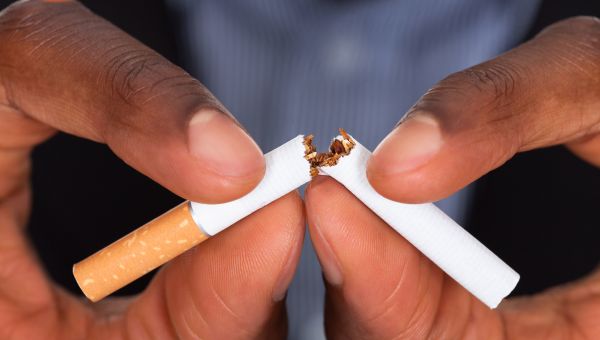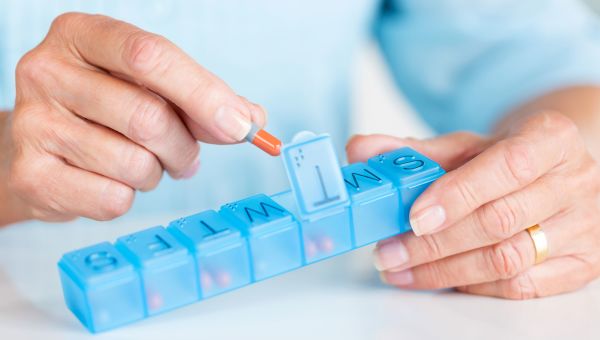7 at-home strategies for heart attack recovery
Start by taking your meds and making your appointments.

If you've had a heart attack, your doctor may refer you for cardiac rehabilitation, a medically supervised program designed to help you recover and improve your long-term heart health. Based on your personal needs, your cardiac rehab team will design a curriculum addressing three major areas: physical activity, lifestyle changes and mental wellbeing. The strategies they teach you will become a part of your everyday life—if you work at making them into habits.
"The purpose of cardiac rehab is to teach you a healthy cardiovascular lifestyle that you can take home with you," says Jason Coker, MD, an interventional cardiologist at Trident Medical Center in Charleston, South Carolina. "But if you stop it when you get home, the benefits of it go away, essentially."
So, how can you make what you learn in cardiac rehab stick when you're away from the clinic or hospital? Try these tips.

Get physical
Physical activity is a key component of cardiac rehab, since getting fit strengthens your heart and boosts your overall health. Your team will create a personal exercise program for you that will likely:
- Start off easier and intensify over time
- Involve one or more cardio activities like walking, jogging, swimming or biking
- Incorporate strength training and flexibility moves
You may also learn simple ways to add activity to your everyday life, whether it's taking longer walks with pets or adding a little extra movement to your chores.
Whatever exercises you learn in rehab, it's important to practice them at home; over time, fitness may become second nature. To help this along, you may want to find a buddy to motivate you and hold you accountable. Your rehab team can help you set goals, like walking a 5k or logging 10,000 steps a day. You might opt to measure your progress over time, as well; the steps tracker on the Sharecare app (available for iOS and Android) can help.

Approach sex carefully
One of the physical activities you might be most curious about is sex; after a heart attack, many wonder if—and when—it's safe to resume. You'll likely be instructed to abstain in the first few weeks following an uncomplicated (or comparatively mild) heart attack, though people who have had more serious health issues or complications may need to refrain longer. The American Heart Association says sex is usually okay once your heart disease has become more stable, but you should first consult your doctor.
"If you can walk four minutes on a treadmill at a couple miles an hour—that's the same amount of exertion for sex," says Dr. Coker. "If you can do that in a supervised setting without symptoms of electrical instability, or things that are concerning to your cardiac rehab physician, then you should be safe to resume sex." He notes that it is situation-dependent, however—and the advice for a 50-year-old may be different than that for a 90-year-old.
Note that it may be difficult to pick right back up; sexual problems occur in up to 75 percent of patients following a heart attack. Medications and fear of additional health issues may play into this. Again, speak to a medical professional for advice; your doctor can reassure you and even prescribe drugs to help, so long as those drugs are safe to take with your other medications.

Eat right and watch your weight
Nutrition is another important part of cardiac rehab; a nutritionist or dietitian can help restructure your diet and teach you to eat the best foods for your heart. Cutting saturated fat, lowering sodium and getting plenty of fresh produce, whole grains and legumes can help reduce your blood pressure and cholesterol, and may help you lose weight.
Speaking about weight—being overweight or obese is a risk factor for heart disease, and your rehab team may make dropping pounds a priority during your program. At home, you can aid the process by using tried-and-true weight loss techniques, like:
- Keeping a food diary
- Drinking water instead of soda
- Planning healthy meals and snacks ahead of time
- Enlisting support from your family and friends
And remember: your rehab team is there to help. If you're stuck, look to them for tips and strategies you can employ at home.

Stop smoking
Few things contribute to your risk of heart problems—or health problems in general—like cigarettes. If you do smoke, your cardiac rehab team will offer strategies for quitting as part of your lifestyle education. To lower your chances of future heart attacks and death from coronary heart disease, it's crucial you take their advice.
Kicking the habit isn't easy—cigarettes create a chemical dependence in your brain, after all—but it can be done. Nicotine replacement therapies like gum, lozenges or patches are proven to help, and exercise and mindfulness practices may be beneficial. Prescription quit drugs may have risks for people with heart disease; your doctor can advise.

Control your conditions—and take your meds
Health conditions like high blood pressure, high cholesterol and diabetes contribute to your risk of heart disease. During cardiac rehab, you'll learn diet, exercise and weight loss strategies to help keep these issues in check.
You'll also learn about medication adherence. It's essential to take your prescribed meds exactly as directed, for these conditions or your specific heart problem. Whether you've been prescribed an ACE inhibitor to treat high blood pressure, a statin to keep your cholesterol in check or aspirin to prevent future heart attacks, adhering to your doctor's orders is a must.
So, make certain to keep track of your medications, including their names, how much you take and when to take them. Note what each drug looks like—color, shape and size. Make sure your meds list is up to date, and never start or stop a prescription without consulting your doctor first; speak up if drug costs are an issue.

Take care of your mental health
Stress, anxiety and depression often go hand in hand with heart disease. Your condition may exacerbate them, and they may contribute to your condition. Of stress, Coker says, "It's essentially a cardiovascular risk factor in a lot of ways, and controlling that is another avenue to decrease your risk of heart disease."
In cardiac rehab, you'll learn stress reduction techniques, along with ways to recognize and address anxiety and depression. These may include speaking with a counselor or joining a support group, a pair of practices you can continue long after your program has ended.
For additional support, you may also want to look online:
- On the American Heart Association's Support Network message boards, you can share your own journey, find others with similar stories and get information and feedback from medical professionals.
- With WomenHeart's Virtual Support Networks, women can teleconference with other patients with heart disease.
- Mended Hearts offers local meetups in addition to their online resources.

Keep your appointments
"Cardiac rehab is somewhat time intensive, three days a week for several hours for three months," says Coker. "Most people want to go back to work or need to go back to work to feed their families." Because of the time commitment and real-life demands, patients may skip visits with their doctor or other members of their team.
But, while it may be tempting to stay home, you should make every effort to keep your appointments. Your team can monitor your status, answer questions and adjust treatments; you can express concerns, ask questions and speak up when something needs clarity. "Making time for it is always a challenge," says Coker. "But it's something important for your healthy lifestyle going forward."
More On


video

article

slideshow


video


video
